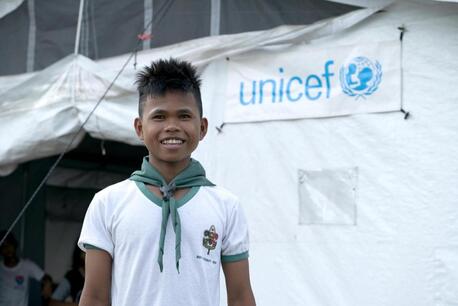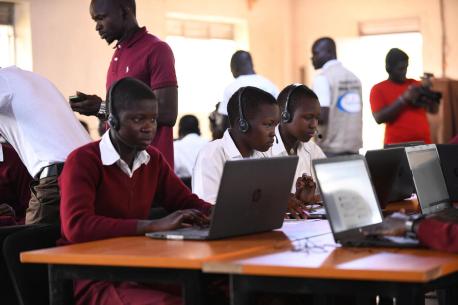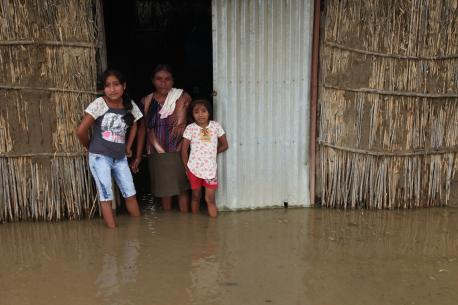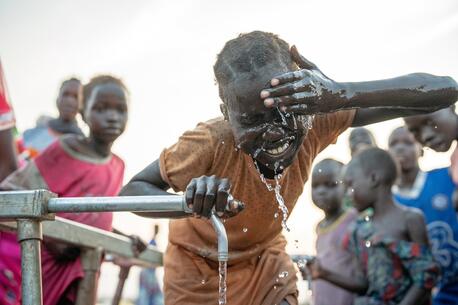
What's Next for the Duke-UNICEF Innovation Accelerator
A unique partnership between UNICEF, UNICEF USA and Duke University focused on helping social entrepreneurs deliver on their innovative ideas. Program resources will soon be made available online. A look at the Accelerator's impact after four years.
A groundbreaking partnership focused on social innovation
Duke-UNICEF Innovation Accelerator (DUIA) was created in 2019 to help social entrepreneurs and organizations advance their innovative solutions to major problems facing the world's children related to water, sanitation and hygiene (WASH) and improve children's lives.
The challenges in WASH are extensive. Inadequate access to safe water and sanitation, for example, can block access to education, especially for menstruating girls, who, because of lack of supplies, information and poor sanitation, frequently miss school.
Through the Accelerator partnership, Duke University and UNICEF provided resources and other support to help a number of carefully selected enterprises expand their market reach and increase their impact.
Over four years, the Accelerator helped 19 social entrepreneurs acquire knowledge, tools and networks to make a real difference for children and families in pursuit of Sustainable Development Goal 6 — a global commitment to ensure availability and sustainable management of water and sanitation for all by 2030. Learn more about the SDGs and how they relate to UNICEF's mission.
With Accelerator support, the 19 enterprises, all based in either East Africa or East Asia and the Pacific regions, deepened their ability to sustainably provide affordable, essential WASH products, services, and programs to millions of people. To date, the ventures have collectively reached over 17 million people worldwide.
As the program comes to a close, plans are under way to digitize the curriculum and related materials and to make those resources available online for free to social entrepreneurs globally.
Here's a look at how the Accelerator worked, and what it achieved.
How the Duke-UNICEF Innovation Accelerator worked
The Accelerator set out to identify innovative social entrepreneurs working on WASH and menstrual health and hygiene challenges, and to provide the most promising among them with wrap-around support to help them scale their operations — and in so doing, help create sustainable ecosystems that better serve the unmet WASH needs of communities.
Those selected to participate were granted access to a network of support that included UNICEF program experts and faculty and students from Duke University's Innovation & Entrepreneurship school. Each enterprise received between $25,000 and $50,000 in unrestricted grants, along with mentorship and coaching support from subject matter experts. There were interactive webinars and workshops. UNICEF shared WASH and market-based sanitation expertise.
The support helped each team refine their strategies and business models, build momentum and expand within their target markets and beyond.
WASH has long been a pillar program for UNICEF. Access to safe water and sanitation is a basic right of every child. It is essential for childhood survival, healthy development, and for ensuring access to education, increasing productivity and building resilience in the face of disease and disaster.
For Duke, the Accelerator was a way to support UNICEF’s goal of giving a fair chance in life to every child, everywhere, while also providing students with an inside look at social innovation and entrepreneurship in action.
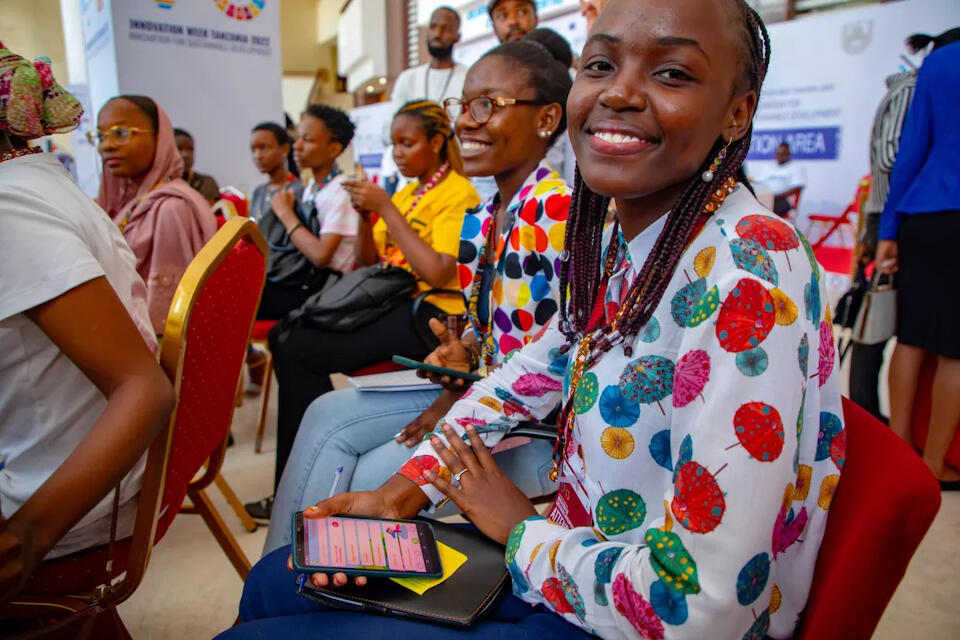
Projects accelerated through the Duke-UNICEF partnership
Six teams of social innovators were selected in 2019 to participate in the Accelerator's first cohort. Each project took on a challenge related to menstrual health and hygiene in East Africa, where lack of basic services and cultural taboos affect the health and hygiene of women and girls. They included:
- Oky, creators of a period tracking app that aims to improve menstrual hygiene practices and knowledge among girls; launching first in Kenya, its creators leveraged Accelerator support to later expand into Burundi and Tanzania
- Lily Health, which reached 555,000 people with its app delivering sexual and reproductive health information and guidance
- SaCoDé, which reached 13,000 students in Burundi with access to modern water ramps for handwashing
- Kasole Secrets, which by the end of 2022 had provided sustainable, affordable pads to 100,000 women across sub-Saharan Africa
- Femme International, accelerated to bring over 16,000 safe and affordable menstrual hygiene products to rural women across Tanzania
- Tai TZ, whose health and safety public service announcements were heard by over 1 million Tanzanians
Cohort 2 focused on providing adequate and equitable sanitation and hygiene and to end open defecation in markets across Africa. Projects included:
- Sanivation, provider of safely managed sanitation in cities across Kenya, reaching 41,000 people in 2022, and raising $3.5 million in Series A funding to scale its operation
- WowMom, an enterprise that added baby changing stations to public restrooms in Nairobi and continues to add new locations, establishing new partnerships across the city to create safe spaces for moms and their children; since joining the Accelerator, WowMom increased their reach from 1,000 to 1,000,000 million children and women
- Eco-soap Bank, which sells and distributes bars of recycled soap, and was able to increase its revenue by 75 percent — and develop a plan to bring its new product SoaPlay to Southeast Asia — with Accelerator support
- Toiletpride, which reached more than 61,000 Nigerians with safe sanitation products (including toilets) and WASH education
- Smart Girls, which reached over 9,000 girls with menstrual health products and information in 2022 and is expanding from Uganda to Tanzania and South Africa
- Kidame Mart, whose last-mile hygiene and health system has reached over 2 million people in Ethiopia
- Tayep, whose Maji Tap handwashing stations improved hand hygiene for over 25,000 children across Tanzania
Six early-stage enterprises were chosen for Cohort 3, which focused on making WASH products and services more adaptive, safe, and resilient in countries in East Asia and the Pacific. Projects included:
- Abundant Water, which provides low-cost ceramic water filters to communities through locally trained sales agents and is currently working to expand their market across Timor-Leste
- Ira Concept, purveyor of organic, sustainable menstrual products that has already doubled its sales in Thailand and is increasing education and donation programs in schools
- Learn to Serve, a savings and loan program for water and sanitation infrastructure projects with 40 households participating in an initial pilot
- Myanmar Kitchen, a premium water brand and purveyor of low-cost water kiosks reaching a record number of people in Yangon with safe water
- Masy Consultants, which launched a WASH education project (WASHed) in schools in the Philippines and is developing an online curriculum to reach even more children
- Te Meau Projects, makers of the efficient Island Compact Toilet
Graduated at the end of 2023, members of Cohort 3 left the Accelerator with concrete, actionable plans to scale, having spent much of their time with Duke-UNICEF improving their business models, operations, and strategies. For more information, see the 2023 DUIA Annual Report.
Innovation Accelerator resources to be digitized and shared
The Accelerator curriculum is in the process of being digitized so it can be offered through Duke’s Coursera education program. The plan is to create a massive open online course (MOOC) hosted by the Center for International Development at Duke University’s Sanford School of Public Policy.
Duke University is a world-class academic institution based in North Carolina. Its Innovation & Entrepreneurship initiative (I&E), operator of the Duke-UNICEF Innovation Accelerator, provides education, expert mentoring, resources, intellectual leadership and community.
UNICEF has worked to support the world’s most vulnerable children for almost 80 years, providing clean water, sanitation, nutrition, immunization, education and other vital services in 190 countries and territories to help every child thrive. UNICEF USA is committed to driving UNICEF's impact for children through partnerships, fundraising, education and advocacy.
Learn more about how UNICEF works to advance innovative solutions to global challenges.
Support UNICEF's mission. Donate today.
